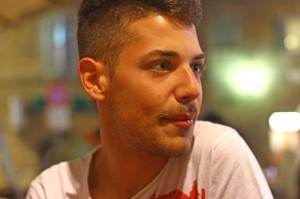A renaissance in how lesbian, gay, bi-sexual and transgender people view themselves and are viewed by others comes to ancient Urbino.
URBINO, Italy — There is a woman in the Piazza Della Repubblica. She wears her favorite dress: A red mini. She puts on makeup. She wants everybody to look at her, but nobody does. She is disappointed.
There is another woman in the square. She wears her casual clothes: Skinny jeans, and a grey, skinny T-shirt. She puts on makeup, too. She just wants to go home. She doesn’t want anyone to look at her, but they do. She is disappointed. Because she is not different, she is just transgender.
In Italy, lesbian, gay, bi-sexual and transgender (LGBT) people have some rights such as same-sex sexual activity, anti-discrimination laws in employment, and the legal right to change their gender designation.
But they still they don’t have rights such as same-sex marriage, anti-discrimination laws in all other areas including hate speech, recognition of same-sex couples, and joint- and step-adoption by same-sex couples.

Davide Caroleo, a student of foreign languages at the University of Urbino, is openly gay and the founder of the LGBT association in Urbino.
A fight for these rights began last year in Urbino with the foundation of a LGBT association, and despite opposition, it is making gains.
“At first we were just three people,” said Davide Caroleo, 21, an openly gay foreign languages student at the University of Urbino, and the founder of the LGBT association. Caroleo spoke through an interpreter.
“We didn’t have just an association, we found friends,” Caroleo said.
Now they are almost 20 people, and they also have straight people in their group. They meet every Wednesday to watch movies, discuss books, and talk about the political and cultural situation in Italy.
Valentina, 24, another member, is studying information science at the University of Urbino. She doesn’t use her real name, and she didn’t want to give her last name because she believes that she might be discriminated against at work.
“I have been living here for five years,” Valentina said. “I am from a small village in the province of L’aquila. The village that I came from is like a fascist stronghold because it’s so conservative. I ran away and came here.”
After she came to Urbino, Valentina went to three different psychologists. They helped her to find her real sexuality.
[pullquote]When I found my model, I was really happy. I understood that I wasn’t alone, and I wasn’t a freak.[/pullquote]
“When I found my model, I was really happy,” she said. “I understood that I wasn’t alone, and I wasn’t a freak.”
Valentina came out to her mother last summer. She said she told her mother, “I have always felt like a woman. I am transgender.” She said that her mother cried because it was not easy to hear.
“My mother said that she knew it, but she was waiting for me to tell her and she loves me under any conditions,” Valentina said. “She also said that when she had a child she was ready for everything: Gay, lesbian, anything, but not transgender.”
Now she is using hormones that she needs for a sex operation. But her father still doesn’t know that she is transgender.
Even though members of the LGBT association said they are happy in Urbino, they said that they still faced discrimination.
[pullquote]Once, we found a swastika on the wall of our meeting place, and then the same night it magically was erased. They still don’t know who painted it, nor who cleaned it off.[/pullquote]
“Once, we found a swastika on the wall of our meeting place, and then the same night it magically was erased,” Caroleo said. They still don’t know who painted it, nor who cleaned it off.
While Valentina and Caroleo—and others in their group—have found some wary peace in Urbino, residents of this Renaissance city are divided in their opinions of LGBT.
Laura Piccinini, 32, a psychologist, said, “I don’t care about sexual orientation, but if we are talking about what is normal, it can be complicated. They are not ‘normal’ sexually because they are a minority, but if we are talking about ethics or religion, then I believe that they are ‘normal.’ ”
A 23-year-old foreign language student, Carmen Siroccni, said, “I don’t think anything special about LGBT people because it is normal. The more you talk about something, then the more it seems different.”
Giuliano Galacci, an 81-year-old retired carpenter, said, “When I see a gay couple on the street, I just think that they are in love with each other.”
Though there are many elderly people who seem to respect LGBT people, there are also those who are strongly against them, perhaps reflecting the social climate in which they were raised years ago in a Catholic country.
“I don’t like LGBT people at all,” said Rosa Maria Cala, 72, a florist. “People are created as man and woman. That’s why they shouldn’t show it, they should live it in private. When I see a homosexual couple on the streets, I find it disgusting.”
Though in the end, acceptance will have to come from within.
“I feel free here,” Caroleo said, “but it is not about Urbino. I am free inside, so I am free every place that I go.”
Multimedia